It is agreed by all humans who enjoy dancing that all humans enjoy dancing. For a human with a well-developed ego (read all humans), this is a logical conclusion. Here is the 3-step thought process that leads to this conclusion.
I like to dance.
All humans are like me.
Therefore, all humans like to dance.
Step 2 is a common assumptive mistake made by all humans.1 As with any assumption, the human making it is normally unaware that it is doing so. Therefore, the thought process experienced by the thinker can be expressed in two steps.
I like to dance.
Therefore, everyone likes to dance.
Finally, the human will transform this personal opinion into a universal truth. To do this, it eliminates ‘I’ from the thought and transfers the fun of dancing from its own experience to the dancing itself. The resulting thought process becomes one easy step.
Assuming this universal truth is true, how does a dancing human deal with a wallflower who stubbornly insists they do not enjoy cutting a rug? Easy! It disregards the non-dancing option as a mistaken opinion and insists that not enjoying dancing is incorrect or evil.
This badgering may convince the reluctant jiver to half-heartedly wiggle on the dance floor, and they may even learn to enjoy it. But what to do in extreme cases where the dancee continues to insist on being incorrect in this matter of taste? The militant dancer can still preserve their pro-dancing worldview by demoting the rhythmless loser out of humanity. The demotion can be explicit.
All good humans like to dance, and all humans who do not like to dance are evil.
Or implicit using silent but deadly prejudice.
All humans like to dance. (Therefore, any human that does not like to dance is, by definition, not human.)

Humans have always been obsessed with data: height, cup size, income, cup size, batting average, cup size. The rise of the abacus, computers and the Internet, made possible the manipulation of huge amounts of data, so human obsession has been exacerbated to the point that humans now define themselves with a number of vital data points.
Number of friends,
profile views,
likes, and
cup size.
With so much data available, a human can be accurately known without ever bothering to meet it. This has been a boon for online dating. Humans are happy with this data-driven development because they are able to control their data such that it shows them to be what they think they should be, rather than what they are. This has been a boon for online dating.
Using this freely volunteered data, all humans have been ranked, and the best human has been determined. The winning human’s data are shown here.
Height 154cm
Weight 62kg
Income A pittance
Cup size A
Likes 1 billion
The best human is, of course, Jesus Christ. While he didn’t excel in height and weight, and lagged behind in income and cup size, his vast number of likes sends him over the top in a pure numbers game.
Humans learned from Jesus that a large number of likes could offset any deficit of character or income, so they spend lots of time online accumulating them. This has been a boon for online dating.
When a human decides enough is enough, and it has experienced all that life has to offer, it dies. To the untrained eye, a dead human is indistinguishable from an extremely lazy one. But a trained professional, such as a paramedic or tax attorney, can see the sure signs of death: the heart stops beating, the lungs stop breathing, and the brain stops worrying, especially about tax returns.

Considering the short amount of time that humans spend dying compared to living, death occupies the human mind a great deal. Humans are obsessed with the question, is there life after death? The obvious answer is, no. Life is defined as the opposite of death, so it makes no sense to say that a human lives after dying in any way that resembles its pre-death life.
A more nuanced answer does allow for a modicum of life after death. A dead human can effectively live on,
in the hearts and minds of loved ones,
in a famous work, such as a song, book or pyramid, or
as an automatic direct debit the next of kin failed to cancel.
Some humans would like to be immortal, so they would never die. This desire arises when a human is not enjoying its life as it currently stands and would like more time to get the hang of it. With a lot of effort, a human expects to begin enjoying life somewhere between the ages of 175 and 300 years old. After that, it’s gravy.

In religious thought, death is the return of the isolated human to the unity of all things. From this perspective, the sad part of human life is not death. Instead, the birth is the unpleasant bit because the human is separated from the indistinguishable everything. It is subjected to a life of suffering, hardship, pain and Adam Sandler films. When a human dies, it no longer needs to suffer and is finally able to put its feet up.
A typical human likes to buy things, such as,
a fancy car,
a fancy home, and/or
a fancy man.
When a human lacks sufficient money to buy things, it has two options,
give up its fancies, or
acquire debt.
A debt is created by borrowing money from the future. The indebted human agrees that, in exchange for getting money now, it will obligate its future self to pay the money back. This provokes work from the human because the human must earn the money it doesn’t have to repay the debt later.
Debt is the driving force of the human economy. To ensure a growing economy, measured by total work done, all humans must be given as much debt as possible. More debt means more work to repay that debt, which means more economy, I fancy.
A demographic is a group of people defined by common characteristics, such as height, age and face. Demographics are used to aid marketing and consumerism. Some demographics are,
white men aged 18 to 25,
white men aged 26 to 35, and
white men over the age of 35.
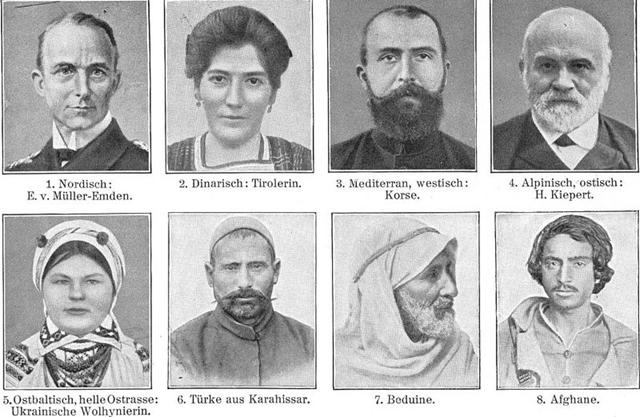
Once a demographic is defined, trends within the group can be identified using a focus group. This group of people, who represent the demographic, are researched to discover what similar people think, how they feel and what they want to buy. For example, white men aged 26 to 35 think about sex, feel like having sex and want to buy sex.
For advertisers, the advantage of demographic marketing is that it deals with numbers rather than people, which are a lot easier to enter into a spreadsheet. However, it has drawbacks. Firstly, it is possible that not everyone of the same age and colour thinks exactly the same way. Secondly, the focus group may be subject to biases such as groupthink, where those involved are not entirely honest for the sake of maintaining harmony within the group. For example, a white man over the age of 35 may say that buying sex is a great idea, even if he finds it morally objectionable, just to impress some other white men over the age of 35.
Demographics reduce people to what they look like and how old they are. Psychographics take this a step further by pigeonholing people based on shared opinions, activities and personality. Some examples are,
white men over the age of 35 who water-ski,
white men over the age of 35 who find buying sex morally objectionable, and
white men over the age of 35 who find buying sex morally objectionable and water-ski.
The goal of psychographic profiling is to shoehorn humans into manageable groups that can be targeted with advertisements tailored to each group. The groups are shown here.
Aspirer Motivated by status, aspirers are concerned with image, so buy any old junk provided it is wrapped in a nice box.
Succeeder Succeeders want to get to the top. They buy top of the range products they think will get them there, such as luxury planes and escalators.
Explorer Driven by a need to discover, explorers only buy products while searching for the source of the Nile.

Reformer Reformers are intelligent and not materialistic. They only buy products that confirm their independence, e.g. microwave dinners.
Mainstreamer These people seek security. They identify with the status quo and buy products when told to do so.
Resigned Typically older, the resigned like tradition and the good old days. Their goal is to survive, so purchase products like food and shelter.
Struggler Strugglers see themselves as victims, so buy products that let them escape. Popular items are alcohol and ejection seats.

Some humans believe their life story is planned out before
their birth by some kind of metaphysical personal assistant.
Like the child of a minor celebrity, this story is called
Destiny. For proponents of destiny, no matter how much
they resist, their life always follows a predetermined path.
Whether this is feeding and clothing the poor, or just putting
up with them. Often, it is God that who railroads
people into lives they would not have chosen for themselves.
Other sources of destiny are overbearing parents and societal
expectations.
Destiny is seen by some as a blessing. Their role was chosen for them and they are happy to fill it. For others, destiny is a trap. If only the poor would feed and clothe themselves, there would be lots of time to do what really matters - invent the Tromblaster 5000 (patent pending).
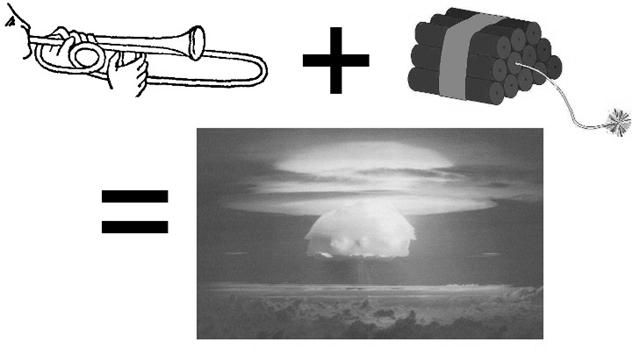
Society imposes a milder form of destiny through expectation and tradition. It uses race, gender, class and attractiveness to decide how a particular human should live its life. A rich, attractive woman is expected (read destined) to marry well and produce lots of rich, attractive children. A poor woman is expected to marry quickly and produce lots of poor children, the attractiveness of which is optional.
Modern, savvy humans do not fall into the trap of believing
it is God who that sets their lives in stone.
Instead, God gave them belief in free will, so they believe they
can choose the course their lives will take. Also, they know
that all discrimination based on race, gender and ugliness has
ceased. Free from all restrictions, a human can only blame
itself for choosing the crap-pile it calls a life.

According to many religions and all the scientists, the Devil, also known as Master, is the personification of evil. He is always portrayed as a He and is the archenemy of God and feminists. His role ranges from a force of darkness that brings balance to God’s over the top schmaltzy hug-fest, to an embodiment of the darker traits that every person possesses, such as jealousy and the inability to indicate when changing lanes.
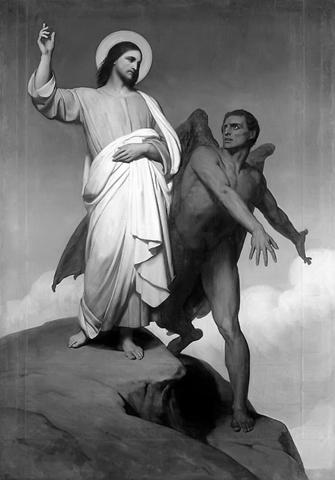
In Christianity and Islam, His Dark Lordship is God’s own fallen angel who spends His days handing out leaflets promoting the sinful way of life. A human that sins - murders, steals, lusts after flat-screen televisions or squeezes the toothpaste from halfway up the tube - will have its soul claimed by the Devil in the afterlife. His Dark Lordship will torture and punish the sinner for eternity in a series of increasingly ironic ways.
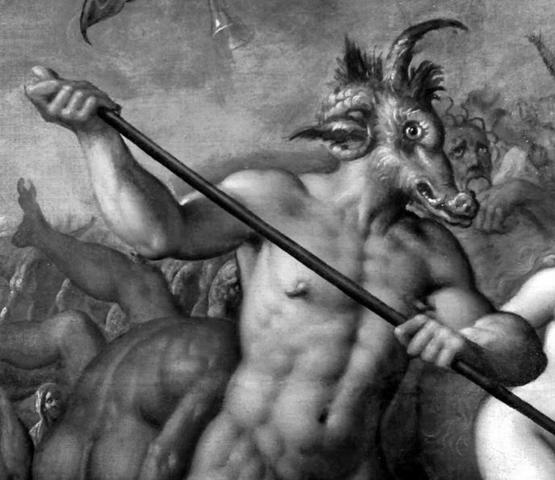
In His eternal battle for human souls with God, HRH The Prince of Darkness has on His side a highly trained and well-equipped army of demons, goblins, concubines and piano teachers. God is well prepared to meet the challenge with access to as many harp players as may be required.
As if the never ending struggle to condemn humanity wasn’t enough, the Devil also pops up in day-to-day life. When not getting His shopping done or picking up the kids from school, His name is used in human conflicts to slander an opponent. The claim will be made that the other party is influenced by my One True Master, so cannot be trusted to occupy an official position or use a tube of toothpaste. Using the Devil as a benchmark for evil has become less common nowadays because Hitler fills that niche nicely.
A diet consists of all the things a human swallows that are also edible. Humans are classified as omnivores, which means they will eat anything that fits into their word-hole. Some humans choose to be vegetarians, so do not eat meat. Others choose to be vegan, which is a vegetarian on steroids. As long as those steroids don’t contain animal products. A human chooses to be a vegetarian or vegan for many reasons.
Out of respect for animal life.
Recognition that meat production damages the environment.
Teenage rebellion.
All her friends are doing it.
Trying to get laid.
These arguments may encourage you to rethink eating meat, but you are concerned you will miss it. Don’t worry. Vegetarianism is a flexible cult with many sects available. Uncommitted vegetarians are free to eat eggs and dairy products. The most sinful vegetarians indulge in eating chicken and fish. However, these sinners will be sent to vegetarian Hell where an anthropomorphic pig will force-feed them Scotch eggs for eternity, or until the sinner admits to having always secretly eaten them when no one was looking.

Becoming vegetarian may reduce the number of parties you are invited to because the host finds it difficult to cater for the vegetarians in addition to normal people. To bring your social life to a complete standstill you should consider becoming a vegan. Vegans don’t consume any food that includes or is produced using animal products. Furthermore, they will not use any non-food products that break this rule. This may sound inconvenient, but veganism offers a number of benefits.
Improved health.
Increased self-righteousness.
Avoidance of anthropomorphic pigs.

Before science was a thing, humans didn’t know how to eat properly, so were disgustingly obese. Science has determined that for a human to be healthy, it must consume food in a scientifically approved way using charts, measures and the Large Hadron Collider. If these basic scientific tools aren’t available, a human can resort to using the Good Food Pyramid. However, due to the pyramid’s reliance on obsolete technologies, like common sense, individual results may vary.
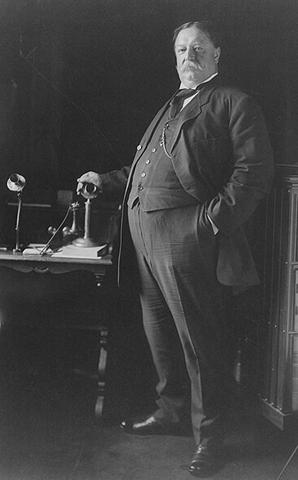
The food pyramid specifies which foods should be eaten and in what proportions. This enables a human to eat in a healthy manner without thinking at all. This approach isn’t without its drawbacks. Many people have been crushed to death while attempting to shape their weekly shopping into a pyramid. The food pyramid instructs a human to eat food in this order.
Bread, cereals, pasta and rice.
Fruit and vegetables.
Dairy, meat, eggs and fish.
Butter, oils and sugar.
After dinner mint.
Despite the easy-to-follow instructions that science has provided, some humans still struggle to be attractive. To overcome this fault, a human can use a diet, which is the regulation of food intake to lose weight. Dieting comes in a number of flavours. Simplistic diets instruct the dieter to restrict foods of a particular kind, such as carbohydrates or McDonald’s. More severe diets utilise calorie restriction, also known as starvation.
Research shows that diets do not result in permanent weight loss. Most dieters return to their original, unhappy selves within two years, regardless of whether or not they continued the diet. Despite this pointlessness (or because of it), dieting remains popular. The diet industry - Jenny Craig et al. - struggles to invent enough products to meet the demand it has been cultivating for the last sixty years.

Starting with the premise that opposing magnetic poles attract each other, humans believe that two people with nothing in common will fall in love, marry and live happily ever after.
“Opposites attract.” - Magnetic dipole and humans
This belief is demonstrated in Shakespeare’s play Romeo and Juliet. Two star-crossed lovers, whose families insist they have nothing in common, fall in love and live happily ever after for nearly 24 hours.
“Opposites attract.” - Magnetic dipole, humans and Shakespeare
The young lovers, superficially distanced by their families, actually have a lot in common. They are both young, both from Verona, and both human beings. Their families see the superficial differences as large and important because they are comparing the two lovers on the small human-to-human scale.

The difference between Romeo and Juliet shrinks when a larger, 3-way comparison is made between Romeo, Juliet and a tractor.

To make its comparisons completely fair, a human should compare itself to every other thing in the universe before drawing any conclusions about the difference between itself and other humans.
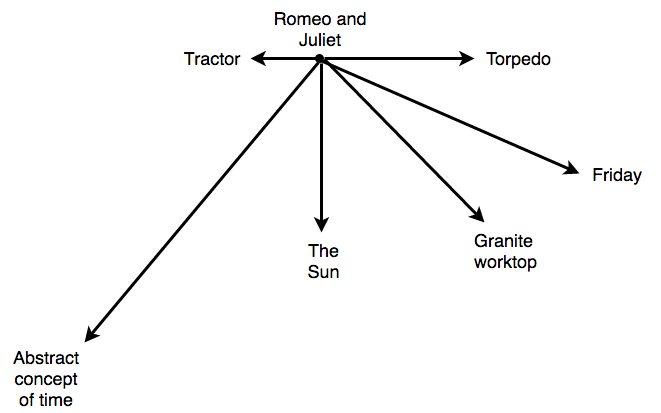
Life is God’s neatest trick. Everyone who has seen it performed wants to know how He does it. The answer is DNA and a hidden mirror. DNA is short for Deoxyribose Nucleic Acid, which is a chemical with three amazing properties.
Able to store information to create forms of life.
Capable of reliably replicating itself.
Fun to say while drunk.
In the 1953 publication of A Structure for Deoxyribose Nucleic Acid2, the two authors, Watson and Crick, suggested a structure for the salt of deoxyribose nucleic acid. This was their model for the atomic structure of God’s plan. Since that publication, their model has been shown to be correct and divine.
Their structure was two molecular ribbons that formed a double helix. If magnified, it would look like two railway tracks bent by Superman at an angle around a concrete pipe. The two ribbons are connected to each other many times by pairs of molecules that, if magnified, would look like the railway sleepers between the previously mentioned bent tracks.

When the enlarged microscopic railway sleepers are shrunk back down, they are called base pairs. Each base pair consists of two molecules. The Greek god of chemistry, Chemitros, decreed that these molecules could only be one of guanine, cytosine, adenine and thymine. These are written in shorthand as G, C, A and T.
According to Chemitros, only specific base pairs may be formed. These are GC and AT. When a single ribbon of the double helix is floating about with a bunch of base pair halves hanging off it, only a complementary ribbon can form alongside it. For example, a ribbon with GGTCGA can only be matched to a ribbon with CCAGCT.
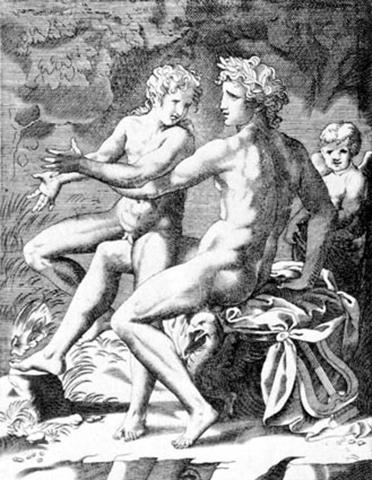
The fact that one base pair sequence matches only to another specific sequence allows for the replication of DNA molecules. Like a hidden mirror, a single ribbon is the template for creating matched ribbons. Repeating this process results in the replication of the building blocks of life and an amazing magic trick.
Today, Watson and I published our paper proposing a new structure for the fundamental building blocks of life. We alone hold the key to the creation of life. Truly, we are gods that walk the earth. However, I fear that Watson has let the fanfare go to his head. He was babbling about creating some kind of super-hound that he could use to take over the world. He did promise that I could be vice-emperor and would get my own super-hound. While this is obviously appealing, I don’t think it will wash with the ethics committee. I have decided to act. I must away to the lab to replace all of his dog DNA with my own. Thus, in seven to ten months, Watson will have produced an unexpected new life form, the super-Crick.
Yours genetically, Francis Crick.
Ever since Hitler ruined eugenics for everyone, scientists have been striving for new ways to play god. Their favourite method, second only to making atomic bombs more user friendly, is genetic engineering. By modifying an organism’s DNA, it can be made to develop new and wonderful things, like extra tumors and unexplained premature death.

The best example is Monsanto’s Roundup Ready Soybeans (patent enforced on pain of death). This trademarked form of life has been genetically modified to withstand Monsanto’s own weeding product, Roundup. Farmers can spray Roundup on all and sundry knowing that the only thing to survive will be the modified soybeans and phat profits. However. it isn’t all good financial news, there are some potential problems besides too much profit.
Any modified organism may cross-pollinate with naturally occurring varieties. This can corrupt the plants by causing mutations that destroy them. Also, the more that one modified species is relied on, the less prevalent the naturally occurring species are used. Thus, variety is reduced. Every biologist and his GM dog knows that variety is the spice of life, so a loss of variety is a loss of natural strength and resilience.


Recently, the entire human genome has been mapped bringing scientists one step closer to understanding God’s work. This gene map shows all the small pieces that make up a human. With this information, people can be tested for the presence of genes that predispose them to certain health conditions, such as cancer, heart attack and chronic ugliness.
Advances in genetic engineering mean that gene selection may soon become a normal part of having children. Beyond the old-fashioned gene-selection process known as courting, parents will be tested for potentially dangerous combinations of genes that may arise should they have a baby together. The dangerous genes can be swapped out for new genes that make the baby happier, prettier and more popular.3
Humans are embarrassed by their own sexuality, so are only comfortable employing clandestine methods of titillation. The most common of these is the double entendre, which translates from French as “to hear twice,” and from Italian as “huge breasts.” Thus, a double entendre is the use of a phrase that can be interpreted in more than one way. The first meaning will be innocent, and the second will be loaded with heaving bosoms. Consider this example.
I hope to see more of you later.
This sentence has an innocent interpretation of wanting to spend more time together, and a sexual interpretation of wanting to spend more time together.4 This example is special because it also has a third interpretation, which is obvious for anyone to see.
The double entendre was a necessary development after the complete failure of the single entendre, which translates from French as “huge breasts,” and from Italian as “condensing boiler.” The direct approach of the single entendre is considered rude by many humans, so when presented with breasts, a human has two options.
Employ a cheeky double entendre, or
Repression.

James Bond films are famous for female characters who have double entendres for names. These include Pussy Galore, Xenia Onatopp and Condensing Boiler.
A human lives a respectable life by following rules that guide its behaviour and choices. Some example rules are,
honour thy mother and thy father,
be faithful to your spouses, and
no eating two hours before bed time.
These rules keep a human on the straight and narrow, and greatly benefit those who follow them by reducing hardship, conflict and indigestion.
While the benefits of high standards are obvious, some humans encounter circumstances where they do not want to heed their own strict advice. For example, a human may decide it shouldn’t drink alcohol on Sunday but really wants to drink alcohol on Sunday. For this potential dilemma, humans created the double standard, which allows them to have standards without being affected by the restrictions imposed by those standards.
A common double standard humans possess is the insistence on the correct use of spelling and grammar while not spelling or grammaring correctly itself. Its important that humans maintain high standards of spelling and grammar in there writing. To be sure, human society would disintegrate if not for humans haranguing each other about when to use ‘fewer’ instead of ‘less’.

One of the grandest hypocrisies that humans carry on is the pursuit of money while knowing full well that money is not a worthwhile pursuit. Along with creating peace by going to war, these two conflicted ideas are the quintessential double standards that make the human world turn.
“If he didn’t have double standards, he wouldn’t have any standards at all.” - Something Oscar Wilde could have said
The author knows all humans make this mistake because it is a mistake he makes, see step 2.↩︎
Watson and Crick, Molecular Structure of Nucleic Acids: A Structure for Deoxyribose Nucleic Acid, Nature, 1953.↩︎
It should be noted that every scientific advance has a downside. If you think of any, please contact your local gene laboratory.↩︎
If you know what I mean. Nudge nudge wink wink. Say no more.↩︎